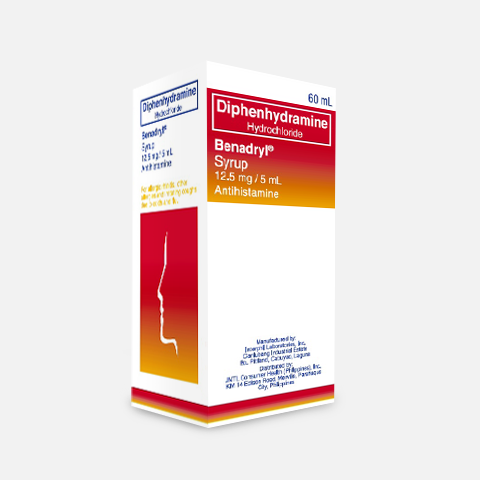-
Product Description
-
Benadryl® AH offers effective restful relief from allergies for children 2 yrs and above
Available in:
Syrup 12.5mg/5ml in 60ml and 120ml bottles
-
-
Ingredients
-
Diphenhydramine HCl
-
-
Directions
-
A single oral dose of diphenhydramine hydrochloride is quickly absorbed, with maximum activity occurring in approximately one hour. The duration of activity following an average dose of Benadryl is from 4 to 6 hours.
The usual adult dosage is 50 mg three or for times daily. Children (over 20 lbs.) 12.5 to 25mg. three or four times daily. Maximum daily dosage not to exceed 300 mg. Based upon body weight, the recommended dosage is 5mg/kg/24 hours.
-
-
Uses
-
Antihistaminic
For perennial and seasonal (hay fever) allergic rhinitis; vasomotor rhinitis, allergic conjunctivis due to inhalant allergens and foos; amelioration of allergic reactions to blood or plasma, dermatographism; as therapy for anaphylactic reactions adjunctive to epinephrine and other standard measures after the acute manifestations have been controlled.
Motion sickness
For active and prophylactic treatment of motion sickness.
Antiparkinsonism
For parkinsonism (including drug induced extra-ptramidal reactions) in the elderly unable to tolerate more potent agents; mild cases of parkinsonism (including drug-induced) in other age groups; in other cases of parkinsonism (including drug-induced) in combination with centrally acting anticholingeric agents.
-
-
Warnings
-
Contradictions
Use Newborn or Premature Infants: this drug should not be used in newborn or premature infants.
Use in Breastfeeding Mother: Because of the higher risk of antihistamines for infants generally and for newborns and prematures in particular, antihistamine therapy is contraindicated in breastfeeding mothers. For pregnant women, consult your doctor before using this product.
Use in Lower Respiratory Disease: Antihistamine should NOT be used to treat lower respiratory tract symptom including asthma.
Antihistamines are also contraindicated in the following conditions: Hypersensitivity to diphenhydramine hydrochloride and other antihistamines of similar chemical structure; monoamine oxidase inhibitor therapy.
Adverse Reactions
1. General: Urticaria, drug rash, anaphylactic shock, photosensitivity, excessive perspiration, chills, dryness of mouth, nose and throat.
2. Cardiovascular System: Hypotension, headache, palpitations, tachycardia, extrasystoles.
3. Hematologic System: Hemolytic anemia, thrombocytopenia, agranulocytosis.
4. Nervous System: Sedation, Sleepiness, Dizziness, disturbed coordination, fatigue, confusion, restlessness, excitation, nervousness, tremor, irritability, insomnia, euphoria, paresthesia, blurred vision, diplopia, vertigo, tinnitus, acute labyrinthitis, hysteria, neuritis, convulsions.
5. GI System: Epigastric distress, anorexia, nausea, vomiting, diarrhea, constipation.
6. GU System: Urinary frequency, difficult urination, urinary retention, early menses.
7. Respiratory System: Thickening of bronchial secretions, tightness of chest and wheezing nasal stuffiness.
Caution: Foods, Drugs, Devices and Consmetics Act prohibits dispensing without prescription for BENADRYL® AH, 50mg.
Warnings
Antihistamines should be used with considerable caution in patients with narrow-angle glaucoma, stenosing-peptic ulcer, pyloroduodenal obstruction, symptomatic prostatic hypertrophy, or bladder-neck obstruction.
Use in Children: In infants and children, especially antihistamine, in over-dosage may cause hallucinations, convulsions or death. As in adults, anti-histamines may diminish mental alertness in children. In the young children, particularly, they may produce excitation.
Use in Pregnancy: Experience with this drug in pregnant women is inadequate to determine whether there exists a potential harm to the developing fetus.
Use with CNS Depressants: Diphenhydramine hydrochloride has additive effects with alcohol and other CNS depressants (hypnotics, sedatives, tranquillisers, etc…)
Use in activities requiring mental alertness: Patients should be warned about engaging in activities requiring mental alertness, such as driving a car or operating appliances, machinery, etc.
Use in the Elderly (approximately 60 years or older): Antihistamines are more likely to cause dizziness, sedation and hypotension in elderly patients.
-
-
Where to Buy





